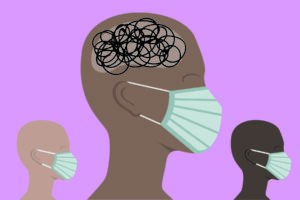
Despite the novel coronavirus currently wrecking global havoc, a mischievous sidekick has tip-toed its way into our peripheral of wellness and into the bodies of people all over the world — anxiety.
While the coronavirus has spread like wildfire with the pandemic’s death toll rising just above 1 million world-wide and 200,000 in this country, public anxiety is spreading even faster. COVID-19 has brought about a surge of psychosomatic illnesses with symptoms mirroring those of the virus itself.
According to Patient.info, a psychosomatic disorder is a“disease which involves both mind and body.” Physical ailments can be easily aggravated by an increase in mental unrest — something often associated with factors such as anxiety and stress.
In an interview with The New York Times, Dr. Toni Goodykoontz, assistant professor of psychiatry for WVU Medicine, attributed many of the symptoms that adults claim to have to psychosomatic disturbances.
“Adults complain of things like headaches, fatigue, just a general feeling of unwellness,” Goodykoontz said. “Part of it is patients will start to imagine that they may have the virus, but most don’t recognize that this is all a manifestation of the fact that they are so overwhelmed and stressed by what’s going on.”
People struggling with anxiety during the coronavirus outbreak may find themselves in a harmful cycle, one in which they stress about the virus and in turn cause themselves to feel sick — thus increasing their anxiety.
A June 2020 scientific journal by Stefanie M. Jungmann and Michael Witthoft observed the correlations between anxiety, cyberchondria (unfounded anxiety that results from looking up illnesses online), and COVID-19, and found positive associations.
“The findings suggest that trait health anxiety and cyberchondria serve as risk factors, whereas information about the pandemic and adaptive emotion regulation might represent buffering factors for anxiety during a virus pandemic,” Jungmann and Witthoft found.
Aside from these relations, there are many symptoms shared by both general anxiety disorders and the coronavirus that could further aggravate the mental state of someone suffering from a psychosomatic illness.
Chest pain, nausea, shortness of breath, chills, and headache are some of the symptoms that can be noted in both a panic attack and a case of the novel coronavirus, according to Medical News Today.
This dilemma leaves the question of what one could possibly do to combat an illness that has manifested from their own thoughts and anxieties.
The Centers for Disease Control and Prevention advises those struggling with stress to take care of their emotional and physical health, take breaks from pandemic related news, and make time to unwind.
Understanding the facts and ignoring the falsities regarding the coronavirus can help make this time less stressful, reduce harmful stigma, and protect one’s psychosomatic state.